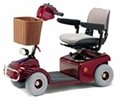
Elderly Foot Care
Information and Resources
Elderly foot care is an important part of health for seniors.
Most people are born with healthy feet but three out of four seniors develop foot problems as they age.
Healthy feet contribute to safety and health in the following ways:
Healthy feet allow you to stay active - You lose strength when your feet are too sore to walk, leading to increased risk of falls. Walking is the perfect exercise to keep your weight down, prevent blood clots and keep your muscles and bones strong.
Keep your balance - Feet that are healthy and pain free help you keep your balance. Good balance prevents falls, a major cause of injury and hospitalization in seniors.
Provide early warning signals - Keeping an eye on your feet can provide early warning signals for health concerns such as diabetes, arthritis, poor blood circulation and nerve damage.
For good foot health, it's also important to improve your general health by daily exercise, smoking cessation and eating healthily.
Basic Foot Care Techniques
Many foot problems can be avoided using basic elderly foot care techniques:
- Check your feet every day - Don't wait until you have pain. Take a few minutes every day to look for swelling, redness, sores, cuts, blisters, bruises, ingrown or infected toenails. If bending is a problem, ask for help or use a mirror (even a long-handled one if necessary).
- Wash your feet every day - Use warm water. Don't soak your feet for longer than 10 minutes, or your skin will get dry and crack. Pat dry instead of rubbing and dry well between and under your toes.
- Care for calluses and trim toenails regularly - Cut nails straight across and never shorter than the end of your toe. Use a nail file for sharp edges. Use the pumice stone for calluses when your feet are still wet.
- Keep your feet soft and smooth - Use unscented cream on the top and bottom of your feet if the skin is cracked or dry.
- Wipe off excess cream and do not apply between toes - Use talcum powder if your feet are sweaty.
- Wear comfortable shoes and socks - Foot problems can be caused or worsened by shoes that don't fit properly, don't give enough support or don't have enough grip on the ground.
- Wear clean socks everyday when wearing socks - They help keep feet dry.
- Avoid socks with ridges or elastic at the top - These can irritate or restrict circulation. Wear white socks when possible. If there is drainage from a cut or sore, it will be easier to see.
If an elderly person is unable to reach their toes or does not have feeling in their feet, it is usually recommended a healthcare professional - such as a foot care nurse or podiatrist - do their foot care if feasible.
Elderly foot care can sometimes be funded through the public health system but would have to be investigated in your area. There are also alternate funding sources that may approve elderly foot care such as Veteran Affairs Canada.
It may make it easier to do daily foot checks if a foot care kit is assembled and available. A foot care kit would contain nail clippers or scissors, nail file, lotion (lanolin based is good), pumice stone and a non-breakable mirror.
Tips for Proper Shoes
Tips for foot friendly shoes and wearing:
- Shake out your shoes before putting them on
- If possible, wear shoes at all times, indoors and out.
- Try to buy shoes with closed toes as they protect your feet from injury
- Buy shoes late in the day as feet tend to swell
- Have your shoes professionally fitted by a footwear specialist if possible
- Heel should be low, less than 5 centimetres
For more information: Shoes for Elderly Women
General Foot Care Advice
Other elderly foot care advice:
- Wear socks at night if your feet are cold (see above for tips on buying socks)
- Elevate your feet when sitting if possible, especially if you have swelling in your feet.
- When sitting for longer periods of time, wiggle your toes and move your ankles around for a few minutes to improve blood flow to the legs
- Do not wear anything tight around your legs, such as tight socks or knee highs, unless compression stocking have been prescribed by your doctor or a qualified foot care specialist
- If numbness or sensation problems are an issue, do not put hot water bottles or heating pads on your feet
- Try not to cross your legs for long periods of time as this can decrease blood and nerves supply
- If your feet are a problem, avoid pedicures by non-healthcare professionals
Consult Your Doctor
Consult your doctor right away if you detect any of the following:
- Any part of your leg or foot turns blue or black
- Reduced sensation to pain or very hot / very cold temperatures
- An injury that doesn't heal or becomes infected
- Any unusual numbness, tingling, cold, cramping or pain in your feet
- Pain while walking that is relieved by rest
Return to Elderly Health Problems
Return to Caring for Aging Parents






New! Comments
Have your say about what you just read! Leave me a comment in the box below.